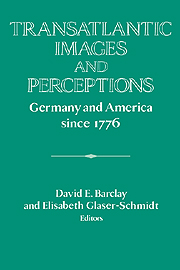Book contents
- Frontmatter
- Introduction
- 1 “Through a Glass, Darkly”: Changing German Ideas of American Freedom, 1776-1806
- 2 “Germans Make Cows and Women Work”: American Perceptions of Germans as Reported in American Travel Books, 1800-1840
- 3 Weary of Germany - Weary of America: Perceptions of the United States in Nineteenth-Century Germany
- 4 “Auch unser Deutschland muss einmal frei werden”: The Immigrant Civil War Experience as a Mirror on Political Conditions in Germany
- 5 Different, But Not Out of This World: German Images of the United States Between Two Wars, 1871-1914
- 6 From Cultureto Kultur : Changing American Perceptions of Imperial Germany, 1870-1914
- 7 The Reciprocal Vision of German and American Intellectuals: Beneath the Shifting Perceptions
- 8 Germany and the United States, 1914-1933: The Mutual Perception of Their Political Systems
- 9 Between Hope and Skepticism: American Views of Germany, 1918-1933
- 10 “Without Concessions to Marxist or Communist Thought”: Fordism in Germany, 1923-1939
- 11 The Continuity of Ambivalence: German Views of America, 1933-1945
- 12 Cultural Migration: Artists and Visual Representation Between Americans and Germans During the 1930s and 1940s
- 13 Representations of Germans and What Germans Represent: American Film Images and Public Perceptions in the Postwar Era
- 14 Chancellor of the Allies? The Significance of the United States in Adenauer's Foreign Policy
- 15 American Policy Toward German Unification: Images and Interests
- 16 Unification Policies and the German Image: Comments on the American Reaction
- Index
6 - From Cultureto Kultur : Changing American Perceptions of Imperial Germany, 1870-1914
Published online by Cambridge University Press: 05 January 2013
- Frontmatter
- Introduction
- 1 “Through a Glass, Darkly”: Changing German Ideas of American Freedom, 1776-1806
- 2 “Germans Make Cows and Women Work”: American Perceptions of Germans as Reported in American Travel Books, 1800-1840
- 3 Weary of Germany - Weary of America: Perceptions of the United States in Nineteenth-Century Germany
- 4 “Auch unser Deutschland muss einmal frei werden”: The Immigrant Civil War Experience as a Mirror on Political Conditions in Germany
- 5 Different, But Not Out of This World: German Images of the United States Between Two Wars, 1871-1914
- 6 From Cultureto Kultur : Changing American Perceptions of Imperial Germany, 1870-1914
- 7 The Reciprocal Vision of German and American Intellectuals: Beneath the Shifting Perceptions
- 8 Germany and the United States, 1914-1933: The Mutual Perception of Their Political Systems
- 9 Between Hope and Skepticism: American Views of Germany, 1918-1933
- 10 “Without Concessions to Marxist or Communist Thought”: Fordism in Germany, 1923-1939
- 11 The Continuity of Ambivalence: German Views of America, 1933-1945
- 12 Cultural Migration: Artists and Visual Representation Between Americans and Germans During the 1930s and 1940s
- 13 Representations of Germans and What Germans Represent: American Film Images and Public Perceptions in the Postwar Era
- 14 Chancellor of the Allies? The Significance of the United States in Adenauer's Foreign Policy
- 15 American Policy Toward German Unification: Images and Interests
- 16 Unification Policies and the German Image: Comments on the American Reaction
- Index
Summary
In January 1871, shortly before the proclamation of the Second Reich at Versailles, the American poet Charles Goethe Baylor dedicated a poem to Germany that illustrates the prevailing sentiment in the United States toward Germany during this time. “America to Germany” begins
All hail! O Bible Land/Grand 'mid the nations stand/by God's degree/For thru the cloud that lowers/Deep 'neath the blood that pours/We see their cause as ours/Dear Germany.
In the poem's four verses, Baylor celebrated German achievements and emphasized the communality of both nations. Indeed, the years following each nation's respective struggle and quest for nationhood - the Civil War in the case of the United States and the wars of unification in the case of Germany - witnessed the high point of German-American relations.
Germany had fought for national unity against an imperial French aggressor, and it had been one of the few friends of the North during the American Civil War. German immigrants had participated, particularly in the Northern armies, in numbers disproportionate to their percentage of the total population, and in so doing had partially liberated themselves from the “foreign” stigma that American nativists attached to them before the war. In 1871 most Americans considered Germany a world leader in cultural pursuits, a land of poets, musicians, writers, philosophers, and scholars.
- Type
- Chapter
- Information
- Transatlantic Images and PerceptionsGermany and America since 1776, pp. 131 - 154Publisher: Cambridge University PressPrint publication year: 1997
- 5
- Cited by



